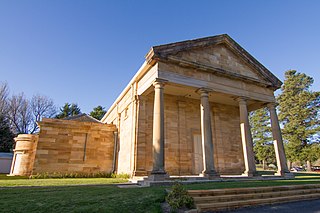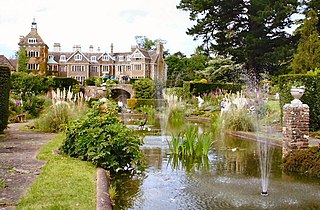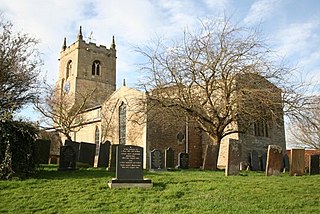
Biggin Hill is a town in the London Borough of Bromley, about 15.2 miles (24.5 km) south-southeast of Charing Cross. It is separated from London's built-up area by the Metropolitan green belt and is located adjacent to the Greater London boundary with Kent and Surrey. Prior to the creation of Greater London in 1965, it was part of Kent. At the 2011 Census, Biggin Hill had a population of 9,951.

Berrima is a historic village in the Southern Highlands of New South Wales, Australia, in Wingecarribee Shire. The village, once a major town, is located on the Old Hume Highway between Sydney and Canberra. It was previously known officially as the Town of Berrima. It is close to the three major towns of the Southern Highlands: Mittagong, Bowral and Moss Vale.

Gepps Cross is a suburb and major road intersection in the north of Adelaide, South Australia. Gepps Cross is traditionally seen as the end of the inner suburbs and the start of the outer northern suburbs, as it was home to a major abattoir with holding yards and other open space. It is the first significant open space encountered after the North Parklands. It retains the open nature, even with warehouses, a velodrome, hockey stadium, Adelaide Raiders – a Croatian soccer club, and karate training facilities.

Elgood's is a family-owned regional brewery in Wisbech, Cambridgeshire, England, which was established in 1795.

Little Easton is a village and civil parish in Essex, England. The village is situated approximately 7 miles (11 km) east from the town of Bishop's Stortford, and 12 miles (19 km) north-west from the county town of Chelmsford. Little Easton parish is defined at the west by the River Roding, and the east by the River Chelmer. The village and civil parish of Great Easton lie one mile (1.6 km) to the north.

Nuthurst is a village and civil parish in the Horsham district of West Sussex, England. The north of the parish borders Horsham town, with Nuthurst village 3 miles (5 km) south from the border. Within the parish is the estate and largely 19th-century country house of Sedgwick Park.

Foston is a village and a civil parish in the South Kesteven district of Lincolnshire, England. The village is situated 5 miles (8 km) northwest of Grantham. The A1 road runs through the parish and borders the south of the village. The population of the civil parish at the 2011 census was 525.

Stalisfield is a village in the borough of Swale in Kent, England, located on a secondary road about 1½ miles (2.4 km) north of Charing and 5 miles south west of Faversham. The parish includes the hamlet of Stalisfield Green.
Coxheath is a village and civil parish within the Borough of Maidstone, Kent, England. The parish is approximately 2.5 miles (4 km) south of Maidstone. It is mainly centred along Heath Road which links the villages of Yalding and Boughton Monchelsea to the west and east, respectively.

Langdon is a civil parish in the Dover district of Kent, England, and contains the villages of East Langdon and West Langdon, and the hamlets of Martin and Martin Mill. Langdon was the site of Langdon Abbey which was dissolved in 1535.

Burton upon Trent has a long history of brewing, at one time exporting beer throughout the world and accounting for a quarter of UK beer production; emulation of Burton water in brewing is called Burtonisation. Much of the town was given over to the industry throughout the 19th century and brewers dominated it politically and socially.

The Ringlestone Inn is an historic public house and restaurant, located in the Ringlestone hamlet near the village of Wormshill in Kent, England. Dating back to the reign of Henry VIII (1509–1547) the current Grade II listed building was constructed in 1533 and retains its original brick and flint walls and oak beams. The interior is unchanged since around 1732 and includes tables crafted from the timbers of an 18th-century Thames barge. An inscription on an ancient oak sideboard formerly found at the property reads: A Ryghte Joyouse and welcome greetynge too ye all, it is now located at Knole as it is inscribed with the names John Tufton, Earl of Thanet and Margaret Sackville of Knole.

Thurning is a small dispersed village and civil parish in the English county of Norfolk and district of North Norfolk, near the border with Broadland. The population at the 2011 Census remained less than 100 and is recorded together with the neighbouring civil parish of Hindolveston.

Littley Green is a hamlet in the civil parish of Great Waltham and the Chelmsford borough of Essex, England. The hamlet is at the extreme north of Great Waltham, with the nearest settlement the hamlet of Hartford End, less than 1 mile (2 km) west in the civil parish of Felsted.
The lost village of Werps was one of a group of small settlements which later became collectively known as Jackfield in the Broseley Parish in Shropshire. The Werps lay on the south side of the river Severn, opposite the Old Coalport China Works and records indicate either three or four public houses, although it is unclear as to whether any of their names are renames of the same building or whether re-built on the same site.

Horsington is a village and civil parish in the East Lindsey district of Lincolnshire, England. It lies on the B1190, 4 miles (6.4 km) north from Woodhall Spa and 6 miles (10 km) west from Horncastle as well as 6 miles east of Bardney. The parish includes the hamlet of Poolham which is situated 1 mi (1.6 km) to the east of the village.

Tydd Gote is an English village, partly, at the north, in the civil parish of Tydd St Mary of the South Holland District of Lincolnshire, and partly, at the south, in the civil parish of Tydd St Giles of the Fenland District of Cambridgeshire.

The Albert is a Grade II listed pub located at 52 Victoria Street in Victoria, London, about 0.4 miles (0.64 km) southwest of Westminster Abbey. Built in 1862 by the Artillery Brewery, the pub retains its striking façade and Victorian features that were undamaged during The Blitz in World War II. The Albert was named in tribute to Queen Victoria's husband, Albert, Prince Consort.
The Southern Heights Light Railway (SHLR) was to have been a speculative London area suburban electric railway between Orpington, Kent and Sanderstead, Surrey. It was authorised in 1928 under the Light Railways Act 1896, but ultimately not constructed. The engineer was to have been Colonel Holman Fred Stephens, heavily involved in the promotion of light railways.

The Commercial is a public house at 210-212 Railton Road, Herne Hill, London. It is cited in 'The CAMRA Regional Inventory for London' as being one of only 133 pubs in Greater London with a pub interior of special historic interest, most notably for its, "Original counters, bar-back, fireplaces and much fielded wall panelling" dating from the 1930s. In July 2016, Lambeth Council designated The Commercial as a locally-listed heritage asset of architectural or historic interest, being described as a, "Two-storey Neo Georgian style inter-war pub with a three-part convex façade which follows the curve of the building line".



















